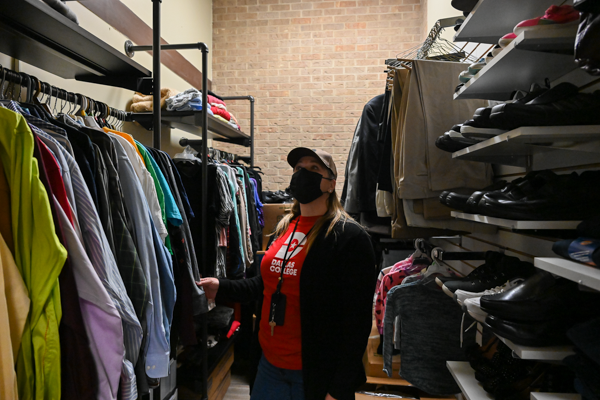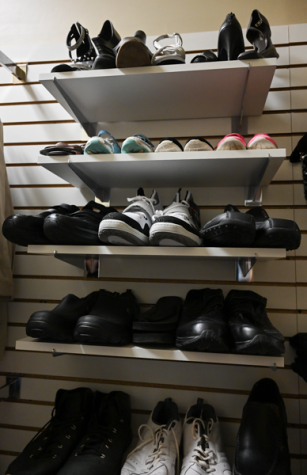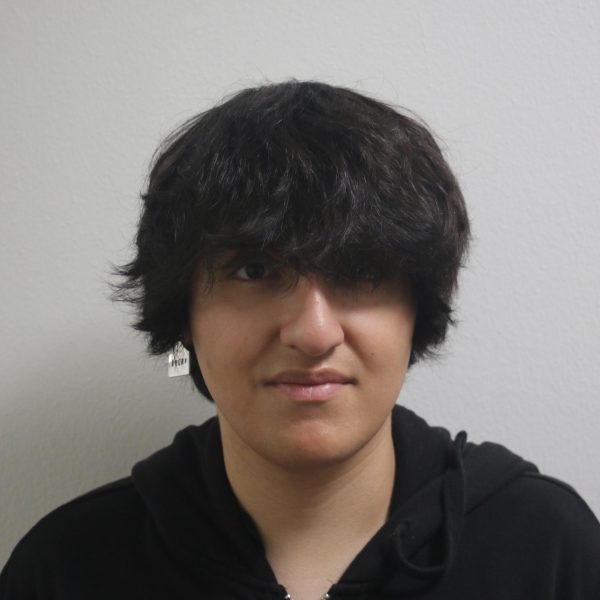Student Care Network offers new resources

Wendy Garner places clothes inside the Honeycomb Cupboard Pantry in C104A. Photo by Rory Moore/The Et Cetera.
February 1, 2022
As people strain to make ends meet amid the COVID-19 pandemic and the rampant omicron variant, coordinators for Dallas College’s Student Care Network are reminding students about expanded resources.
The Student Care Network is a triage of resources composed of a campus’ basic needs and community connections, counseling services and health services.
Recently, the food pantries for all campuses have expanded to include clothing closets.

Wendy Garner, case manager for Eastfield’s food pantry in C-105, said that the goal is to help students receive presentable clothes for job interviews.
“As case managers, we come together and look at what could possibly hinder a student’s education,” Garner said. “If it’s an issue with basic needs, health or emotions, we help students with their particular needs.”
The food pantry also introduces students to the non-food services provided by the Student Care Network. Alongside providing clothing, Dallas College now allows students to borrow laptops and Wi-Fi hotspots at their campus library.
“When people walk by [the food pantry], it’s like a grocery store – it automatically catches their eye,” Garner said. “You don’t see the counselors or nurses with their door open and people go, ‘It’s so pretty in there. Let me go in there.’”
Garner’s job as a case manager involves reviewing individual cases of food insecurity and helping meet students’ needs. Case managers can even review rental assistance applications, which students can fill out through the Student Care Network’s website.
“It’s [a good visualization] for a student to come in and say they need these services,” Garner said. “As we build that relationship, we learn that they need more.”
[READ MORE: Honeycomb Cupboard food pantry gets more space, adds new services]
In 2020, at the height of the lockdown, the Student Care Network received additional funding from the Dallas College Foundation and CARES Act to cover the increased number of students dealing with basic needs insecurity.
Since the network’s founding, Eastfield’s Health Center in C-139 offers free health consultations and screenings through appointments, but students can also walk in to receive health services. However, campus nurse Nancy Abdo said that students primarily learn about these services through the food pantry.
“We just need to make sure students know about us,” Abdo said. “A lot of times, students don’t actually know they have a health center.”
Eastfield counselor Jaime Torres said a similar trend occurs when students come for counseling appointments in C-140.
Information to schedule appointments for these resources can be found on the network’s website at: dallascollege.edu/studentcare.
“Anything that will help get this information to the students would really benefit [the Student Care Network],” Torres said. “I hear students saying they weren’t aware. And then they’re appreciative when they do find out about counseling services, nursing services and the food pantry.”
Abdo and Torres frequently host educational presentations in classrooms to help bring awareness to the Student Care Network and its services.
Thanks to additional government aid and funding, the Student Care Network now offers a wider selection of services.
“There’s a single parent mom who makes just enough money to not get the SNAP benefits she needs,” Garner said, “But she was able to get the food she needed with [the food pantry]. That helped her lessen the stress of how she’s going to feed her kids. These resources helped her stay in school.”
The Student Care Network also has stories for how Dallas College benefits from students obtaining the resources they need.
“[Students] don’t have to try and get [the meningitis vaccine] somewhere else,” Abdo said. “They can get it here and help with the enrollment process.”
[READ MORE: Q&A: Counselor helps students overcome obstacles, succeed]
Alongside vaccinations for COVID-19 and meningitis, students can receive free HIV and STD testing.
The counseling center has received praise for its versatile counseling services.
“I’ve had students come back and tell me how appreciative they are for counseling services,” Torres said. “Because of the skills learned in counseling, they were able to cope with anxiety or depression.”
Even if there’s an issue that the network can’t address directly, coordinators can refer students to off-campus resources.
The Student Care Network is partnered with a variety of community providers, specializing in a wide array of services – from legal aid to
health information. This outreach allows the network to host its services with massive outreach.
“We’re trying to offer services on campus as much as we can,” Garner said. “[Students] need assistance to get in a place where they can focus
on their studies. That’s what the Student Care Network is.”



